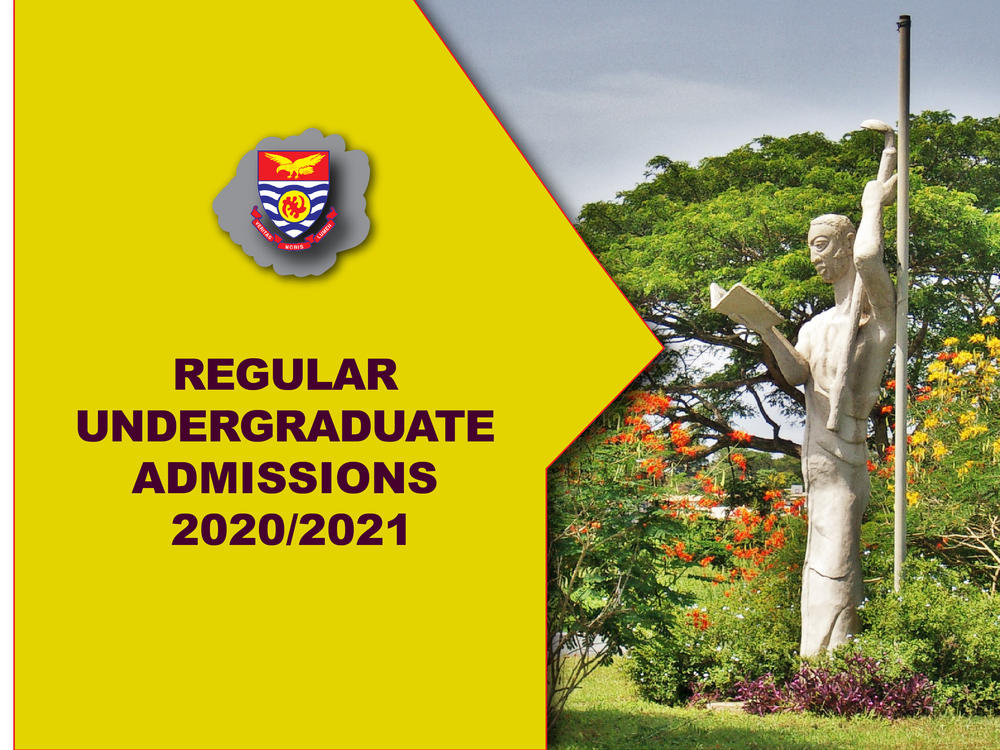UNDERGRADUATE DISTANCE ADMISSIONS 2020/2021 ACADEMIC YEAR
Applications are invited from suitably qualified persons, especially basic school teachers, clerks, secretarial and accounting personnel in the civil/public service, commerce and industry, and WASSCE/SSSCE graduates for admission into Distance Learning Programmes of the College of Distance Education, University of Cape Coast for the 2020/2021academic year, via direct entry or through mature applicants’ route.
The application forms will be on sale from 10th February, 2020 to 8th May, 2020 for Mature Applicants (MEE) and 10th February, 2020 to Monday, 31st August, 2020 for DIRECT Applicants.
1.0 PROGRAMMES AVAILABLE FOR 2020/2021 ACADEMIC YEAR
A. EDUCATION PROGRAMMES
1. 2-year Bachelor of Education in Basic Education (2 PDE/BBE)
2. 2-year Bachelor of Education in Educational Psychology (2 BEP)
3. 2-year Bachelor of Education in Science Education for Diploma in Science Education Holders or its equivalent from recognized tertiary institutions.
4. 2-year Bachelor of Education in Mathematics Education for Diploma in Mathematics Education Holders or its equivalent from recognized tertiary institutions.
5. 3-year Bachelor of Education in Basic Education (3PDE/BBE/BED) for holders of Specialist Certificates in Education or Diploma in subjects other than Education from recognized Tertiary Institutions.
6. 3-year Bachelor of Education in Education Psychology (3BEP) for holders of Specialist Certificates in Education or Diploma in subjects other than Education from recognized Tertiary Institutions.
7. 4-year Bachelor of Education in Mathematics (B.Ed. Mathematics)
8. 4-year Bachelor of Education in Science (B.Ed. Science)
9. 4-year Bachelor of Education in Accounting (B.Ed. Accounting)
10. 4-year Bachelor of Education in Management (B.Ed. Management)
11. 4-year Bachelor of Education in Social Studies (B.Ed. Social Studies)
12. 4-year Bachelor of Education in Arts (B.Ed. Arts)
13. 4-year Bachelor of Education in Early Childhood Education (B.Ed. Early Childhood)
14. 4-year Bachelor of Education in Primary Education (B.Ed. Primary Education)
15. 4-year Bachelor of Education in Junior High School Education (B.Ed. Junior High School Education)
B. BUSINESS PROGRAMMES
1. 2-Year Diploma in Commerce (Accounting)
2. 2-Year Diploma in Commerce (Management)
3. 2-Year Bachelor of Commerce (Accounting)
4. 2-Year Bachelor of Commerce (Finance)
5. 2-Year Bachelor of Commerce (Management)
6. 2-Year Bachelor of Commerce (Human Resource Management)
7. 2-Year Bachelor of Commerce (Marketing)
8. 2-Year Bachelor of Commerce (Procurement and Supply Chain Management)
9. 3-Year Bachelor of Commerce (Accounting)
10. 3-Year Bachelor of Commerce (Finance)
11. 3-Year Bachelor of Commerce (Management)
12. 3-Year Bachelor of Commerce (Human Resource Management)
13. 3-Year Bachelor of Commerce (Marketing)
14. 3-Year Bachelor of Commerce (Procurement and Supply Chain Management)
15. 4-Year Bachelor of Commerce (Accounting)
16. 4-Year Bachelor of Commerce (Finance)
17. 4-Year Bachelor of Commerce (Management)
18. 4-Year Bachelor of Commerce (Human Resource Management)
19. 4-Year Bachelor of Commerce (Marketing)
20. 4-Year Bachelor of Commerce (Procurement and Supply Chain Management)
2.0 ENTRY REQUIREMENT FOR THE PROGRAMMES
A. EDUCATION PROGRAMMES – DIRECT ENTRY
A1. 2-YEAR BACHELOR OF EDUCATION IN BASIC EDUCATION (2PDE/BBE)
Applicants must possess Diploma in Basic Education/Diploma in Psychology and Foundations of Education/Diploma in Early Childhood Education awarded by UCC or
any recognized institution.
A2. 2-YEAR BACHELOR OF EDUCATION IN EDUCATIONAL PSYCHOLOGY (B.ED. PSYCHOLOGY)
Applicants must possess Diploma in Psychology and Foundations of Education/ Diploma in Basic Education / Diploma in Early Childhood Education awarded by UCC or
any recognized institution.
A3. 2-YEAR BACHELOR OF EDUCATIONIN SCIENCEEDUCATION (B.ED. SCIENCE)
Applicants must possess Diploma in Science Education from UCC or its equivalent from any recognized tertiary institution but NOT Diploma in Basic Education.
A4. 2-YEAR BACHELOR OF EDUCATION IN MATHEMATICS EDUCATION (B.ED. MATHEMATICS)
Applicants must possess Diploma in Mathematics Education from UCC or its equivalent from any recognized tertiary institution but NOT Diploma in Basic Education.
A5. 3-YEAR BACHELOR OF EDUCATION IN BASIC EDUCATION (3PDE/BBE/B.ED)
Applicants must be holders of Specialist Certificates in Education and Diploma in subjects other than Education.
A6. 3-YEAR BACHELOR OF EDUCATION IN EDUCATIONAL PSYCHOLOGY (3BEP)
Applicants must be holders of Specialist Certificates in Education and Diploma in subjects other than Education.
A7. 4-YEAR BACHELOR OF EDUCATION IN MATHEMATICS (B.ED. MATHEMATICS)
Applicants must possess any one of the following:
i. West African Senior Secondary School Certificate Examination (WASSCE)
Candidates must obtain passes (A1-C6) in six (6) subjects comprising three core subjects, including English Language and Core Mathematics and Integrated Science or Social Studies. In addition, candidates must have passes in Elective Mathematics and any two of the following elective subjects: Financial Accounting, Business Management, Economics, Physics and Chemistry. The applicant’s aggregate should not exceed 36.
ii. Senior Secondary School Certificate Examination (SSSCE)
Candidates must obtain passes (A-D) in six (6) subjects comprising three core subjects, including English Language, Core Mathematics and Integrated Science or Social Studies. In addition, candidates must have passes in Elective Mathematics and any two of the following elective subjects: Financial Accounting, Business Management, Economics, Physics and Chemistry. The applicant’s aggregate should not exceed 24.
iii. General Certificate in Education (GCE) - Advanced Level Candidates
Candidates must obtain pass in Mathematics and any one of the following: Financial Accounting, Business Management, Economics, Physics and Chemistry with grades not lower than D. In addition, applicants must possess credit passes (Grade 6) at G.C.E. ‘O’ Level English Language and Mathematics.
A8. 4-YEAR BACHELOR OF EDUCATION IN SCIENCE (B.ED. SCIENCE)
Applicants must possess any one of the following:
i. West African Senior Secondary School Certificate Examination (WASSCE)
Candidates must obtain passes (A1-C6) in six (6) subjects comprising three core subjects, including English Language, Core Mathematics and Integrated Science or Social Studies plus any three elective science subjects. The applicant’s aggregate should not exceed 36.
ii. Senior Secondary School Certificate Examination (SSSCE)
Candidates must obtain passes (A-D) in six (6) subjects comprising three core subjects, including English Language, Core Mathematics and Integrated Science or Social Studies plus any three elective science subjects. The applicant’s aggregate should not exceed 24.
iii. General Certificate in Education (GCE) - Advanced Level Candidates
Candidates must obtain passes in two elective science subjects with grades not lower than D. Mathematics. In addition, applicants must possess credit passes (Grade 6) in G.C.E. ‘O’ Level English Language and Mathematics.
A9. 4-YEAR BACHELOR OF EDUCATION IN ACCOUNTING (B.ED. ACCOUNTING)
Applicants must have a minimum pass grade (A1-C6 for WASSCE and A-D for SSSCE) in English Language, Core Mathematics and Social Studies or Integrated Science.
Applicants are also required to have a minimum pass grade of (C6 or D) in Accounting and any two subjects in the following: Business Management, Economics, Elective Mathematics and Principles of Cost Accounting.
A10. 4-YEAR BACHELOR OF EDUCATION IN MANAGEMENT (B.ED. MANAGEMENT)
Applicants must have a minimum pass grade (A1-C6 for WASSCE and A-D for SSSCE) in English Language, Core Mathematics and Social Studies or Integrated Science. Applicants
are also required to have a minimum pass grade of (C6 or D) in Business Management and any two subjects in the following: Accounting, Economics, Elective Mathematics and Principles of Cost Accounting.
A11. 4-YEAR BACHELOR OF EDUCATION (B.ED. SOCIAL STUDIES)
Applicants must have a minimum pass grade (A1-C6 for WASSCE and A-D for SSSCE) in English Language, Core Mathematics and Social Studies or Integrated Science. Applicants are also required to have a minimum pass grade of (C6 or D) in Geography and Economics; and any one pass grade in the following subjects: History, Literature in English, French, Christian Religious Education, Islamic Religious Education and any of the Ghanaian Languages.
A12.4-YEAR BACHELOR OF EDUCATION IN ARTS (B.ED. ARTS)
Applicants must have a minimum pass grade (A1-C6for WASSCE and A-D for SSSCE) in English Language, Core Mathematics and Social Studies or Integrated Science. Applicants are also required to have a minimum pass grade of (C6 or D) in any three of the following subjects: History, Literature in English, French, Christian Religious Education, Islamic Religious Education and any of the Ghanaian Languages.
A13. 4-YEAR BACHELOR OF EDUCATION IN EARLY CHILDHOOD EDUCATION (B.ED. EARLY CHILDHOOD EDUCATION)
Applicants must have a minimum pass grade (A1-C6for WASSCE and A-D for SSSCE) in English Language, Core Mathematics and Social Studies or Integrated Science. Applicants are also required to have a minimum pass grade of (C6 or D) in any three elective subjects.
A14. 4-YEAR BACHELOR OF EDUCATION IN PRIMARYEDUCATION (B.ED. PRIMARY EDUCATION)
Applicants must have a minimum pass grade (A1-C6for WASSCE and A-D for SSSCE) in English Language, Core Mathematics and Social Studies or Integrated Science. Applicants are also required to have a minimum pass grade of (C6 or D) in any three elective subjects.
A15. 4-YEAR BACHELOR OF EDUCATION IN JUNIOR HIGH SCHOOL EDUCATION (B.ED. JUNIOR HIGH SCHOOL EDUCATION)
Applicants must have a minimum pass grade (A1-C6for WASSCE and A-D for SSSCE) in English Language, Core Mathematics and Social Studies or Integrated Science. Applicants are also required to have a minimum pass grade of (C6 or D) in any three elective subjects.
B. BUSINESS PROGRAMMES -DIRECT ENTRY
B1. 2-YEAR DIPLOMA IN COMMERCE (ACCOUNTING)
Applicants must possess any one of the following (from i-viii)
i. Professional Accountancy Certificate with a minimum of Part 1 of:
· Institute of Chartered Accountants (Ghana),
· Chartered Institute of Management Accountants,
· Association of Certified Chartered Accountants,
· Institute of Bankers,
· Ghana Accounting Technicians Examination (GAT) and Accounting Technicians Scheme West Africa (ATSWA).
In addition to the above, applicants should possess passes in Mathematics and English.
ii. WASSCE passes (A1-D7) in five (5) subjects, three of which should be credit passes (A1-C6) including English Language and Mathematics. Applicants should also have passes in other elective subjects including Accounting or strong mathematics-related elective.
iii. SSSCE passes (A-D) in five (5) subjects including English Language and Mathematics. Applicants should also have passes in other elective subjects including Accounting or strong mathematics-related elective.
iv. General Business Certificate Examination (GBCE) and RSA Stage II with at least grade D in 5 subjects including Accounting, Business Management, English Language and Mathematics.
v. Advanced Business Certificate Examination (ABCE) and RSA Stage III with passes in three (3) subjects including Financial Accounting and Economics with grades D or better.
In addition, applicants must possess passes in English Language and Mathematics with at least grades D7 in WASSCE, D in SSCE or credit (6) at ‘O’ Level or better.
vi. London Chamber of Commerce (Intermediate) with three passes in subjects including Financial Accounting, Economics and Management. In addition, applicants must possess passes in English Language and Mathematics with grades D7 in WASSCE, D in SSCE or credit (6) at ‘O’ Level or better.
vii. G.C.E. ‘O’ Level with a minimum of 5 credits in 5 subjects including English Language, Mathematics and Financial Accounting.
viii. G.C.E. ‘A’ Level with passes in Two (2) subjects including Accounting with grade not lower than D. In addition, they must possess credits at G.C.E. ‘O’ Level in Mathematics and English.
B2. 2-YEAR DIPLOMA IN COMMERCE (MANAGEMENT)
i. The entry requirements are the same as that of Diploma in Commerce (Accounting) above except that the subjects should include Commerce, Office Administration/Practice, Business Management and other related disciplines.
ii. Holders of Private Secretary Certificates may also apply.
B3. 2-YEAR BACHELOR OF COMMERCE (ACCOUNTING)
Holders of any of the under listed qualifications from recognized institutions will be admitted to this programme;
i. Diploma in Commerce
ii. Diploma in Commerce (Accounting)
iii. Higher National Diploma (HND) in Accountancy
iv. Higher National Diploma (HND) in Entrepreneurship & Finance
v. Final Certificate in Ghana Accounting Technician Examination (GAT)/ Accounting Technicians Scheme West Africa (ATSWA)
vi. Part II of Professional Accountancy Examinations (ACCA, CIMA) from recognized Examination Body.
vii. ICA part II or 2B in the old system or ICA part III in the new system from recognized Examination Body
B4. 2-YEAR BACHELOR OF COMMERCE (FINANCE)
Holders of any of the under listed qualifications from recognized institutions will be admitted to this programme;
i. Diploma in Commerce
ii. Diploma in Commerce (Accounting)
iii. Higher National Diploma (HND) in Accountancy
iv. Higher National Diploma (HND) in Engineering and Statistics (with at least Second Class Lower or better)
v. Higher National Diploma (HND) in Entrepreneurship & Finance
vi. Final Certificate in Ghana Accounting Technician Examination (GAT)/ Accounting Technicians Scheme West Africa (ATSWA)
vii. Part II of Professional Accountancy Examinations (ACCA, CIMA) from recognized Examination Body.
viii. ICA part II or 2B in the old system or ICA part III in the new system from recognized Examination Body
B5. 2-YEAR BACHELOR OF COMMERCE (MANAGEMENT)
Holders of any of the under listed qualifications from recognized institutions will be admitted to this programme;
i. Diploma in Management Studies
ii. Diploma in Commerce
iii. Diploma in Commerce (Accounting)
iv. Diploma in Commerce (Management)
v. Higher National Diploma (HND) in Accountancy
vi. Higher National Diploma (HND) in Supply Chain Management
vii. Higher National Diploma (HND) in Secretaryship & Management Studies
viii. Higher National Diploma (HND) in Bilingual Secretaryship and Management Studies
B6. 2-YEAR BACHELOR OF COMMERCE (HUMAN RESOURCE MANAGEMENT)
Holders of any of the under listed qualifications from recognized institutions will be admitted to this programme;
i. Diploma in Management Studies
ii. Diploma in Commerce
iii. Diploma in Commerce (Accounting)
iv. Diploma in Commerce (Management)
v. Higher National Diploma (HND) in Accountancy
vi. Higher National Diploma (HND) in Supply Chain Management
vii. Higher National Diploma (HND) in Management
viii. Higher National Diploma (HND) in Secretaryship& Management Studies
ix. Higher National Diploma (HND) in Bilingual Secretaryship and Management Studies
B7. 2-YEAR BACHELOR OF COMMERCE (MARKETING)
Holders of any of the under listed qualifications from recognized institutions qualify for this programme;
i. Diploma in Commerce
ii. Diploma in Management Studies
iii. Diploma in Commerce (Accounting)
iv. Diploma in Commerce (Management)
v. Higher National Diploma (HND) in Marketing
vi. Higher National Diploma (HND) in Accountancy
vii. Higher National Diploma (HND) in Purchasing and Supply and Supply Chain Management
viii. Higher National Diploma (HND) in Secretaryship& Management Studies
ix. Higher National Diploma (HND) in Bilingual Secretaryship and Management Studies
B8. 2-YEAR BACHELOR OF COMMERCE (PROCUREMENT AND SUPPLY CHAIN MANAGEMENT)
Holders of any of the under listed qualifications from recognized institutions qualify for this programme;
i. Diploma in Management Studies
ii. Diploma in Commerce (Management)
iii. Higher National Diploma (HND) in Purchasing and Supply
iv. Advanced Diploma in Procurement and Supply from Chartered Institute of Procurement and Supply (CIPS)
v. Advanced Diploma in Purchasing and Supply from Chartered Institute of Purchasing and Supply (CIPS)
vi. Higher Diploma in Supply Chain Management from the Ghana Institute of Freight Forwarders (GIFF) and International Federation of Freight Forwarders Association (FIATA)
vii. International Advanced Diploma in Logistics and Transport from the Chartered Institute of Logistics and Transport (CILT)
B9. 3-YEAR BACHELOR OF COMMERCE (ACCOUNTING)
The three-year structure for accounting programme is designed for candidates with little or no background in accounting at the Diploma level. These include:
i. Diploma in Management Studies
ii. Diploma in Commerce (Management)
iii. Higher National Diploma (HND) in Marketing
iv. Higher National Diploma (HND) in Management
v. Higher National Diploma (HND) in Supply Chain Management
vi. Higher National Diploma (HND) in Tourism Management
vii. Higher National Diploma (HND) in Secretaryship& Management Studies
viii. Higher National Diploma (HND) in Bilingual Secretaryship and Management
ix. Higher National Diploma (HND) in Statistics and Engineering (With Third Class and Pass)
x. Diploma in Business Studies applicants must possess four (4) credit passes in WASSCE (A1-C6) / SSSCE (A-D) including English and Mathematics.
xi. Any other qualification equivalent to Diploma from a related discipline
B10. 3-YEAR BACHELOR OF COMMERCE (FINANCE)
The three-year structure for finance programme is designed for candidates with little or no background in finance at the Diploma level. These include:
i. Diploma in Commerce (Management)
ii. Diploma in Management Studies
iii. Higher National Diploma (HND) in Marketing
iv. Higher National Diploma (HND) in Management
v. Higher National Diploma (HND) in Supply Chain Management
vi. Higher National Diploma (HND) in Tourism Management
vii. HND Statistics and Engineering (With Third Class and Pass)
viii. Higher National Diploma (HND) in Secretaryship& Management Studies
ix. Higher National Diploma (HND) in Bilingual Secretaryship and Management Studies
x. Diploma in Business Studies applicants must possess four (4) credit passes in WASSCE (A1-C6) / SSSCE (A-D) including English Language and Mathematics.
xi. Any other relevant qualification equivalent to a Diploma in a related discipline.
B11. 3-YEAR BACHELOR OF COMMERCE (MANAGEMENT)
The three-year structure for management programme is designed for candidates with little or no background in general management at the Diploma level. These include:
i. Higher National Diploma (HND) in Marketing
ii. Higher National Diploma (HND) in Tourism & Hospitality Management.
iii. Diploma in Business Studies applicants must possess four (4) credit passes in WASSCE (A1-C6) / SSSCE (A-D) including English Language and Mathematics.
iv. Any other qualification equivalent to Diploma from a related discipline
B12. 3-YEAR BACHELOR OF COMMERCE (HUMAN RESOURCE MANAGEMENT)
The three- year structure for B.Com (Human Resource Management) programme is designed for applicants with little or no background in general management but hold a diploma in a related field or discipline. They include:
i. Higher National Diploma (HND) in Marketing
ii. Higher National Diploma (HND) in Supply Chain Management
iii. Higher National Diploma (HND) in Tourism & Hospitality Management.
iv. Diploma in Business Studies applicants must possess four (4) credit passes in WASSCE (A1-C6) / SSSCE (A-D) including English and Mathematics.
v. Any other qualification equivalent to a Diploma in a related discipline.
B13. 3-YEAR BACHELOR OF COMMERCE (MARKETING)
i. The three- year structure for B.Com (Marketing) programme is designed for applicants with little or no background in general marketing but hold a diploma in a related field or discipline. They include:
ii. Higher National Diploma (HND) in Tourism & Hospitality Management.
iii. Diploma in Business Studies applicants must possess four (4) credit passes in WASSCE (A1-C6) / SSSCE (A-D) including English Language and Mathematics.
iv. Any other qualification equivalent to Diploma from a related discipline
B14. 3-YEAR BACHELOR OF COMMERCE (PROCUREMENT AND SUPPLY CHAIN MANAGEMENT)
The three- year structure for B. Com (Procurement and Supply Chain Management) programme is designed for applicants with little or no background in procurement management but hold a diploma in a related field or discipline. They include:
i. Diploma in Commerce
ii. Diploma in Commerce (Accounting)
iii. Diploma in Procurement and Supply from Chartered Institute of Procurement and Supply (CIPS)
iv. Diploma in Purchasing and Supply from Chartered Institute of Purchasing and Supply (CIPS)
v. Diploma in Supply Chain Management from the Ghana Institute of Freight Forwarders (GIFF) and International Federation of Freight Forwarders Association (FIATA)
vi. Diploma in Logistics and Transport from the Chartered Institute of Logistics and Transport (CILT)
vii. Higher National Diploma (HND) in Marketing
viii. Higher National Diploma (HND) in Management
ix. Higher National Diploma (HND) in Secretaryship& Management Studies
x. Higher National Diploma (HND) in Bilingual Secretaryship and Management Studies
xi. Higher National Diploma (HND) in Accountancy
xii. Higher National Diploma (HND) in Tourism and Hospitality Management
xiii. Diploma in Business Studies applicants must possess four (4) credit passes in WASSCE (A1-C6) / SSSCE (A-D) including English Language and Mathematics.
xiv. Any other qualification equivalent to Diploma from a related discipline
B15. 4-YEAR BACHELOR OF COMMERCE (ACCOUNTING)
Applicants must possess any one of the following (from i-vi)
i. Senior Secondary School Certificate Examination (SSSCE)
Candidates must obtain passes (A-D) in six (6) subjects comprising three core subjects, including English Language and Core Mathematics and Integrated Science or Social Studies. Also, candidates must have passes in any three elective subjects including Financial Accounting. The applicant’s aggregate should not exceed 24.
ii. West African Senior Secondary School Certificate Examination (WASSCE)
Candidates must obtain passes (A1-C6) in six (6) subjects comprising three core subjects, including English Language and Core Mathematics and Integrated Science or Social Studies. Also, candidates must have passes in any three elective subjects including Financial Accounting. The applicant’s aggregate should not exceed 36.
iii. General Business Certificate Examination (GBCE)
Candidates must obtain passes (A-D) in six (6) subjects comprising three core subjects, including English Language and Core Mathematics plus any three elective subjects would be eligible for admission into level 100.
iv. General Certificate in Education (GCE) - Advanced Level Candidates
Candidates must obtain passes in three subjects (at least, one of the passes should be grade D or better). In addition, they must possess credit passes (Grade 6) in five G.C.E. ‘O’ Level subjects including English Language, Mathematics and Science (for non-science students).
v. Advanced Business Certificate Examination (ABCE) Holders
Candidates with full Diploma in ABCE must have credit passes in five (5) subjects including English Language, Core Mathematics, Integrated Science or Social Studies in the General Business Certificate Examination, SSSCE or WASSCE. Candidates may be considered for admission at Level 200 of a degree programme.
vi. Professional Certificate Holders
Candidates with Part 1 of the following Professional Accountancy Bodies may be admitted:
· Institute of Chartered Accountants (Ghana),
· Chartered Institute of Management Accountants,
· Association of Chartered Certified Accountants,
· Institute of Chartered Secretaries and Administrators and
· Chartered Financial Analysts
vii. Foreign Qualification
All foreign qualifications would be referred to the National Accreditation Board (NAB) for determination of equivalences and eligibility for admission to the programme.
B16. 4-YEAR BACHELOR OF COMMERCE(FINANCE)
This programme is by course work and project work.
The entry requirements are the same as that of Bachelor of Commerce (Accounting option) EXCEPT that the elective subjects need not include Financial Accounting. Applicants with non-business background but have Elective Mathematics or strong Mathematics-related discipline (Economics, Statistics, and Geography) may also apply.
B17. 4-YEAR BACHELOR OF COMMERCE(MANAGEMENT)
This programme is by course work and project work. Applicants with any of the following qualification may apply:
i. Senior Secondary School Certificate Examination (SSSCE)
Candidates must obtain passes (A-D) in six (6) subjects comprising three core subjects, including English Language and Core Mathematics and Integrated Science or Social Studies; plus, any three business elective subjects. The applicant’s aggregate should not exceed 24.
ii. West African Senior Secondary School Certificate Examination (WASSCE)
Candidates must obtain passes (A1-C6) in six (6) subjects comprising three core subjects, including English Language and Core Mathematics and Integrated Science or Social Studies; plus, any three business elective subjects. The applicant’s aggregate should not exceed 36.
iii. Professional Examination Certificate Holders
Candidates with Part 1 of the Institute of Chartered Secretaries and Administrators are eligible to apply.
iv. General Business Certificate Examination (GBCE) and Advanced Business Certificate Examination
Candidates must obtain at least five passes credit passes in English, Business Mathematics, Economics and Commerce. Candidates must obtain at least two subjects in Advanced Business Certificate Examination.
B18. 4-YEAR BACHELOR OF COMMERCE (HUMAN RESOURCE MANAGEMENT)
This programme is by course work and project work. The entry requirements are the same as that of the Bachelor of Commerce (Management).
B19. 4-YEAR BACHELOR OF COMMERCE (MARKETING) AND
B20. 4-YEAR BACHELOR OF COMMERCE (PROCUREMENT AND SUPPLY CHAIN MANAGEMENT)
These programmes are by course work and project work. Applicants with any of the following qualifications may apply:
i. West African Senior Secondary School Certificate Examination (WASSCE)
Candidates must obtain passes (A1-C6) in six (6) subjects comprising three core subjects, including English Language, Core Mathematics and Integrated Science or Social Studies; and any three elective subjects in the following areas, General Arts, Science, Agriculture, Home Economics and Visual Arts. The applicant’s aggregate should not exceed 36.
ii. Senior Secondary School Certificate Examination (SSSCE)
Candidates must obtain passes (A-D) in six (6) subjects comprising three core subjects, including English Language, Core Mathematics and Integrated Science or Social Studies; and any three elective subjects in the following areas, General Arts, Science, Agriculture, Home Economics and Visual Arts. The applicant’s aggregate should not exceed 24.
iii. General Business Certificate Examination (GBCE)
Candidates must obtain passes (A-D) in six (6) subjects comprising three core subjects, including English Language and Core Mathematics plus any three elective subjects would be eligible for admission into level 100.
iv. General Certificate in Education (GCE) Advanced Level Candidates
Candidates must obtain passes in three subjects (at least, one of the passes should be grade D or better). In addition, applicants must have had credit passes (Grade 6) in five G.C.E. ‘O’ Level subjects including English Language, Mathematics and Science (for non-science students).
v. Foreign Qualification
All foreign qualifications would be referred to the National Accreditation Board (NAB) for determination of equivalences and eligibility for admission to the programme.
3.0 ENTRY BY MATURE EXAMINATION:
Applicants who do not meet the specified requirements for Direct Entry into the above programmes can gain admission to the programme when they pass a Mature Entrance Examination (MEE). Preparatory classes will be held from 25th April, 2020 to 8th May, 2020 at selected Examination Centres throughout the country to enhance applicants’ chances at passing the Entrance Examination. The examination will be held on Saturday, 9th May, 2020 and Sunday, 10th May, 2020.The preparatory classes and the Mature Entrance Examination shall take place at the designated examination centres throughout the country.
Applicants seeking admission as Mature Candidates must have any one of the following:
· Minimum of WASSCE/SSSCE or G.C.E. ‘O’ Level Certificate
· NVTI Certificate
· Holders of NABPTEX Certificate or Diploma in Business Studies (DBS) Certificate awarded by the Technical Examination Unit of GES.
· Applicants should have a background in the preferred programme.
· Applicants should be at least 25 years old by 30th April, 2020. Applicants should attach copies of birth certificates that are at least five years old at the time of the application.
NB. Applicants who do not have credit passes in English and Mathematics at either WASSCE/SSSCE or G.C.E. ‘O’ Level would be required to register for and pass special examinations in those subjects.
4.0 ENTRANCE EXAMINATION
Main Papers
The main examinations for candidates will comprise;
i. General Paper
ii. Aptitude Test
Special Papers
Special examinations in Mathematics and English Language for candidates who do not have credit passes at G.C.E. ‘O’ Level (grade 6 or better) or WASSCE/SSSCE (grade C6/D or better).
5.0 SALE OF APPLICATION FORMS
The cost of an Application Form is as follows:
1. Direct Applicant (Diploma and Degree Programmes)
The cost of an Application Form is Two Hundred and Twenty Ghana Cedis (GH¢220.00).
2. Mature Entrance Examination Applicants
The cost of an Application Form is Two Hundred and Twenty Ghana Cedis (GH¢220.00).
In addition, applicants are required to pay an additional Two Hundred Ghana Cedis (GH¢200.00) as bankers draft at GCB Bank. This fee covers the cost of Study Materials, Tuition, and Examination Fee.
NOTE: The GCB bank draft should be submitted during registration for the Mature Entrance Examination, at the preferred examination centre.
6.0 SALES CENTRES
The requisite application forms can be obtained from the following places:
(a) All Branches of GCB Bank Ghana Ltd.
(b) All Branches of Agricultural Development Bank (ADB) Ghana Ltd.
(c) All Branches of Zenith Bank Ghana Ltd.
(d) All Branches of Consolidated Bank
(e) All Branches of Prudential Bank Ltd.
(f) All Branches of GT Bank
(g) All branches of ARB APEX Bank and All Rural and Community Banks
(h) All branches of Republic Bank
(i) All Regional and Major District Offices of GHANA POST.
7.0 ONLINE APPLICATIONS
(a). Applicants will be given a receipt containing a pin and serial number at the various Sale Centres. This will be used to complete the Application Form Online. Applicants should
take the receipt to the nearest Study Centre Coordinator for further instructions.
(b). Online applicants should visit www.ucc.edu.gh, then go to Admissions and click on Apply Online for further instructions. Applicants should then select DISTANCE application type.
(c). All applicants are required to provide the following information on the large EMS envelope:
(i) application reference number
(ii) names in full, no abbreviations accepted
(iii) address
(iv) study/examination Centre
(v) region
(vi) contact number
vii) programme – which should be hand written.
(d). Applicants should ensure that all WASSCE/SSSCE results are verified. Copy of the Confirmation Page together with a copy of Academic Transcript and Certificates should
be submitted to the nearest College of Distance Education Study Centre or to Ghana Post Office.
8.0 REGIONAL OFFICES AND STUDY CENTRES OF COLLEGE OF DISTANCE EDUCATION:
Applicants should submit their completed Application Forms or Enquire about the Sale of Application Forms from the following Regional and Study Centres of the College of Distance Education, University of Cape Coast branches:
Ashanti: Kumasi Office (Tafo Nhyiaso), Obuasi (Obuasi Snr High Technical Sch), Offinso (Dwamena Akenten SHS), Simms, Serwa Nyarko, KSTS, Asante Mampong Technical College of Education, Mansoman SHS,
St. Paul’s Lutheran Sch., KTI, WESCO, KASS, Kumasi T. I. AMASS, Tepa SHS, Nkawie Sec Tech and Konongo Odumasi SHS.
Bono: -Sunyani Office (Abesim, Asana Junction), Sunyani Technical University, Dormaa SHS, Drobo SHS, Nkoranza Sec. Tech. Sch., Nkoranman SHS Seikwa,
Bono East: -Techiman SHS, Kintampo SHS, Wenchi Farm Institute, Atebubu SHS.
Ahafo: -Hwidiem SHS
Central – Regional office (CoDE UCC), Swedru (SWESBU & SWESCO), Assin Foso (Obiri Yeboah SHS), Apam SHS, Breman Asikuma SHS, Dunkwa-On-Offin (Boa Amponsem SHS), Kasoa (High Class International School, Mary Star of the Sea, Norris Josling Int. Sch.),
Twifo Praso SHS, Mfantsiman Girls SHS.
Eastern – Koforidua Office (Okorase Junction 10), Oda (Attafuah SHS), Abetifi College of Education, Somanya Sec. Tech., Akwamuman SHS (Akosombo), Begoro Presec SHS, Oyoko Methodist SHS, Ghana Secondary School and IGNIS School Nsawam, Nsawam Prisons.
Greater Accra - Accra (Papafio Hills and Zenith College), Ada (Ada College of Education, Ada SHS), Tema (Tema SHS, Mante-Din); Dansoman (St. Margaret Mary Sec. Tech.) Fafraha Community SHS, Maranatha University College, Accra High SHS, St. Paul’s Lutheran School (Tema, Kanda, Madina), West Africa Sec Sch.- Adenta and UCC Accra Office, Tesano.
Northern -Tamale Office (Vittim), Tamale Technical University, Tamale College of Education and Salaga SHTS
Savannah: Damongo SHTS
North East: Gambaga Girls SHS
Upper East – Bolgatanga Office (Yikeni on the Navrongo Rd.), Bolga Girls SHS, Bolga Tech. Institute, Notre Dame Minor Seminary, Zebilla SHS, Sandema SHTS.
Upper West: - Wa (WaSec), Nandom SHS, Tumu College of Education, Lawra SHS
Volta: – Ho Office (Little Bethlehem), Akatsi (Akatsi College of Education), Hohoe (St. Teresa’s College of Education), Mafi Kumasi Sec Tech, Keta Business College.
Oti: – Jasikan (Jasikan College of Education).
Western North: Bibiani Sec Tech, Sefwi Debiso College of Education, Juaboso SHS and Sefwi Wiawso College of Education.
Western – Takoradi Office (Ntankorful), Tarkwa (Fiaseman SHS), Nsein SHS, Fiaseman SHS. Enchi College of Education, Wassa Akropong SHS, Asankragwa SHS.
Note the following:
1. The closing date for sale of application forms is 8th May, 2020 for MEE Applicants and 31st August, 2020 for DIRECT Applicants.
2. All applications should be submitted online. Duly submitted applications will have application numbers auto-generated.
3. After purchasing the e-voucher, applicants are informed to go to the nearest CoDE Study Centre Coordinators to assist them in filling the forms online. The confirmation page should be printed and submitted together with photocopies of certificates, results slips/transcripts to the Coordinator soon after submitting online. Application numbers should be quoted when communicating with the College.
4. Application forms that do not have photocopies of certificates, results slips/final GPA of transcripts will not be processed.
5. Keep photocopies of the confirmation page and receipt with pin and serial numbers for reference purposes.
6. No change of programme will be allowed after submission of the application on-line. Applicants are therefore advised to read the requirements carefully before selecting a programme.
7. Foreign applicants will pay their fees in US Dollars.
REGISTRAR








